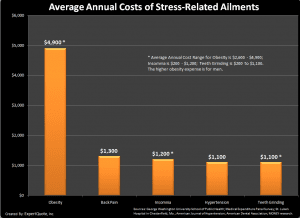As stress continues to be linked to a myriad of health problems — and costs — insurance companies are starting to look into preventive measures. A recent article (February 22) published in the US edition of Metro delved into the issue.
Consider the cost for a quadruple bypass surgery: $62,500 on average, according to the American Heart Association, a number that does not include the cost of home care, medicine or follow-up appointments. Preventive care is the key to saving money — particularly when it comes to ailments caused by stress.
According to Forbes, workplace stress alone is responsible for up to $190 billion in annual U.S. healthcare costs.

An epidemic of toxic stress
“Stress has been called the black plague of the 21st century,” says Bob Roth, the executive director of the David Lynch Foundation, which teaches the Transcendental Meditation technique. “Modern medicine has no pill we can take to prevent stress or treat it. We can manage it through Ambien for sleeping or Xantax for anxiety, but that does not get to the underlying cause of stress.”
And insurance companies are doing their research, too, confirms Rebecca Palm, cofounder of CoPatient, a service that helps consumers tackle expensive medical bills.
“Preventative care is one way of lowering health care costs by treating patients before any problems become much larger and more costly down the line,” Palm says. “Providing stress-reducing benefits, whether it is covering yoga and other preventative care measures, are just a few examples of some of the innovative ways that the [insurance] industry is reacting to people’s needs.”
Evidence matters
But don’t expect to be able to cash in on anything vaguely labeled as meditative.
“Saying ‘meditation’ on its own doesn’t mean anything,” Roth says. “There has to be a systematic way of teaching it and evidence that it works.” One way this is done, Roth says, is by studying the levels of cortisol — the stress hormone — in the body.
To him, what’s exciting is that the evidence is there, at least for Transcendental Meditation, which he teaches.

“If you get a good night’s sleep, cortisol levels drop about 10 percent. During 20 minutes of TM, cortisol levels drop about 30 percent every time. There are several research studies that have come out and shown significant reduction in medical costs and admission to people who practice TM,” he says.
“The evidence is there. It’s just a matter of time and the slow wheels of government.”
Read full article in Metro



















